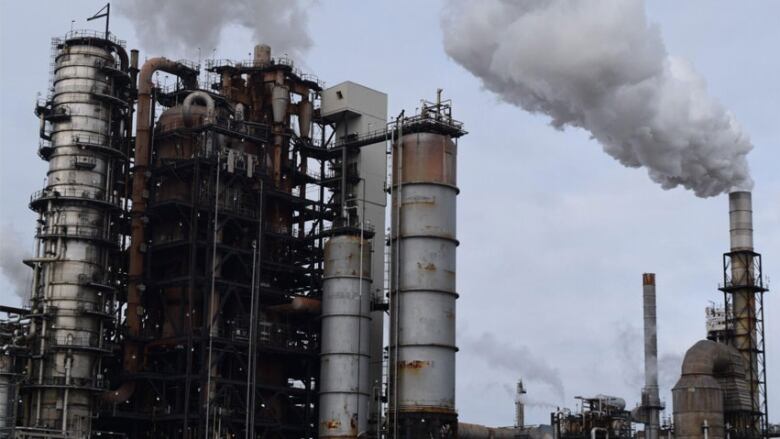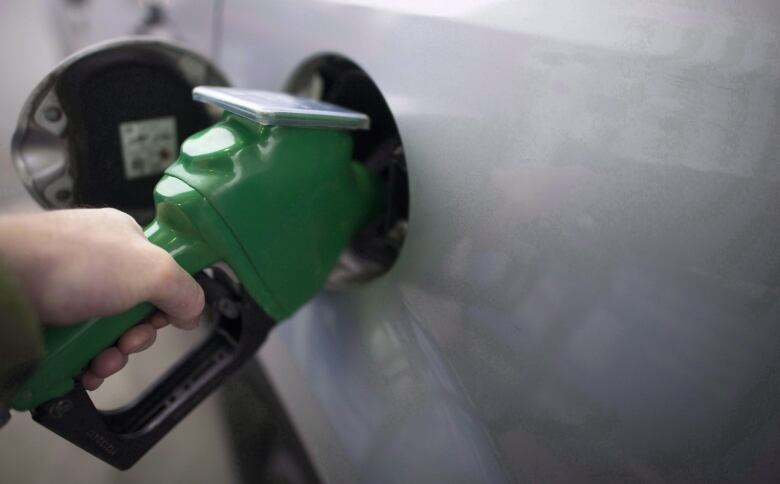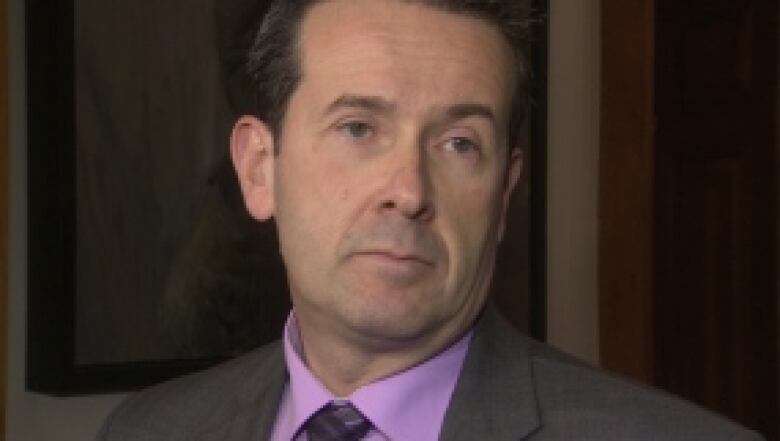Gallant's carbon plan could spell trouble for Irving Oil refinery
Industry expert says costs of environmental regulation could force some refineries to close

Irving Oil's Saint John refinery could be threatened by the Gallant government's carbon-pricing decisions, according to a national organization representing oil companies.
The Canadian Fuels Association says the decision to adopt the federal plan for a carbon levy on industry including a potential requirement for reductions of 30 per cent could force some refineries to close.
"A business of any kind ultimately needs to remain competitive in the market in which it operates," said the association's president, Peter Boag.
"There's a point at which the costs of that environmental regulation and it's not just that single requirement, but the cumulative costs render a facility not longer economically viable, and then ultimately businesses make decisions."
- Feds likely to step in, says think-tank that found provincial carbon plan wanting
- Has the province hit its emissions goal? Depends which goal, Liberals say
Irving Oil has not responded to multiple requests from CBC News for comment on the Liberal government's climate planunveiled last December. Boag stressed he wasn't speaking for Irving but was commenting on refineries in general.
But it was clear from his comments that he believes New Brunswick's decision to adopt the federal model, rather than develop its own, could spell trouble for Irving. The company's refinery is the largest single emitter of carbon dioxide in the province.
Ottawa's plan "imposes an emission reduction requirement on refineries that no refinery in the world is able to achieve," Boag said. "It's really just a question then of paying for emissions."

The Trudeau Liberals have developed what they call a carbon-pricing "backstop" that they will impose on any province that refuses to create its own system.
Provinces can also choose to accept the federal model. New Brunswick has developed its own carbon tax system for consumers, but will adopt the federal system for industry.
A draft version of the plan will require large facilities to reduce emissions by 30 per cent of the average in their sector, or be forced to purchase credits.
Impossible target
Boag says it's an impossible target no refinery in the world could meet, and the cost of buying the credits will damage a refinery's bottom line, perhaps turning it into a money-loser.
He says refiners like Irving, which export large volumes of finished gasoline to the United States, have to compete with other suppliers so they can't raise their prices to pass on the cost of the levy.
The lead author of a new report by a pro-carbon-tax think tank, Canada's Ecofiscal Commission, says that's "a legitimate concern" but it's one the federal plan "is tackling in a really direct way."
Dale Beugin says Irving Oil can actually profit from the system if it reduces its emissions enough to earn credits it can then sell to other refineries.
"The backstop creates incentives to reduce [greenhouse gas] emissions by improving emissions performance, not to reduce emissions by just shutting production down or shifting production out-of-province," he said. "That's the right mix."
But Conservative MP Ed Fast, the party's environment critic, shared the association's gloomier prediction. "You can be guaranteed that investment is going to flee New Brunswick" if the federal industrial levy is applied here, he said.

In an email statement to CBC News, provincial environment minister Serge Rousselle said the federal system would ensure "big emitters are paying their fair share" while eliminating the potential cost of New Brunswick having to administer its own regime.
Rousselle's statement, sent in response to an interview request, said the province will ask Ottawa to ensure the system doesn't make New Brunswick industries uncompetitive.
Irving Oil has managed to comply with other environmental regulations over the years, including a Clean Air Act passed in 1997 and stricter sulphur dioxide standards.
The challenge that we do have if you're already one of the best, how much more room is there to improve?- Dale Cooper, Irving Oil
But the company has also had to contend with air-quality concerns at its rail terminal, flaws with emissions controls at its marine terminal, and a recent butane leak from one of its local pipelines.
In 2016, Irving Oil officials told a committee of MLAs studying the climate question that its refinery already had lower emissions than many of its counterparts.
"The challenge that we do have if you're already one of the best, how much more room is there to improve?" Dale Cooper, Irving's general manager for refining and feedstocks, asked at the time. "That will be our fundamental challenge."
Irving didn't say at the time what kind of carbon-pricing mechanism it favoured.
Boag said the association supports "the concept" of carbon pricing, but wants an approach "that also recognizes and responds to the challenges of industries that are energy intensive and compete in global markets."
Ottawa's 30-per-cent-below-average target is still just a draft proposal and could change after federal consultations with industry.
Boag pointed out that by drafting their own provincial policies on industrial carbon prices, Ontario, Quebec, Alberta and British Columbia have exempted their refineries from the 30-per-cent target.
Asked if New Brunswick should do the same, Boag said, "that's certainly an opportunity that's open to any province."












_(720p).jpg)


 OFFICIAL HD MUSIC VIDEO.jpg)
.jpg)



























































































